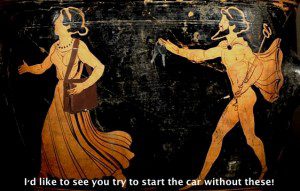It’s six in the morning, and my sleep ends abruptly with a too-vivid dream of a male voice that is not my husband’s whispering in my ear. “Hey, boo, are you awake?”
I give a start, then, I sigh, “I am now. What’s up, Hermes?”
 The rest of the conversation occurs astrally. He asks me what I’m going to do today, I ask him how things are going in Greece. I get up, shower, dress. We chat over breakfast, and I tell him about some person I just met who he’d like. He reminds me that I left my keys inside the freezer, suggesting that I really ought to just leave them on my bicycle.
The rest of the conversation occurs astrally. He asks me what I’m going to do today, I ask him how things are going in Greece. I get up, shower, dress. We chat over breakfast, and I tell him about some person I just met who he’d like. He reminds me that I left my keys inside the freezer, suggesting that I really ought to just leave them on my bicycle.
Sounds nice, right? I have a best friend who can make sure that the walk light is on when I need to cross the street, or that a taxi pulls up the minute I get lost anywhere. Okay, so, he also sometimes donates my laptops and cell phones to the poor without asking me. No one is perfect. I accept his faults, he accepts mine. We enjoy each other’s company as much as any two people could reasonably be expected to.
There’s just one problem: I’m an Observant Jew.
I have known a large number of people who expressed bafflement that I could have such experiences of Pagan deities and remain as religiously Jewish as I am. After all, I recognize that their gods exist, how could I not worship them?
I answer that Judaism is a religion of law and tradition, not one of faith. Like a Buddhist, I ask, “What do gods have to do with my religion?”
Keeping It Jewish
I am not seeking a syncretism. I don’t consider myself to be a Hellenic Pagan, I don’t attend Hellenic festivals, I don’t belong to any Greek Pagan organizations or mailing lists. I doubt I would be welcome there if I tried. I am also not trying to find a place for Hermes in my Judaism. I know too much about Judaism to think that such a thing is possible or appropriate.
“Lo yiyeh l’cha elohim acherim Al Panai”
“Thou shalt not have other gods in My Presence”
“Al Panim” doesn’t actually translate as “in my presence.” It literally means “On My Face.” The word for face here is related to “b’panim,” the word for insides. It also means, idiomatically, something like “all up in my business.”
Breaking this down for meaning…
“On my face” — Like a mask. Do not, in other words, worship another deity and say, “Hashem is an aspect of this deity.”
“On my insides” — Do not look at God and say, “the other gods and goddesses are aspects of Hashem.”
“All up in My business” — Do not mix other gods into Jewish worship or practice.
That’s pretty exhaustive. Syncretism in a religious sense did not seem like an option, and I like my religion. Running around with pagan deities just didn’t seem…. kosher.
I’ve tried a number of solutions to the problem of having Pagan gnosis. Certainly, Hermes seemed pleasant enough, so my first solution was to try and prove to myself that the entity in question was a projection of my unconscious mind, or some other being, maybe an angel, that I was simply interpreting as Hermes because of my Pagan past. I was secretly excited by the notion that he was a projection of my unconscious mind, because he seemed to be able to do some pretty blatant acts of magic.
The most concise rebuttal to this proposal is that my smartphone needs an ancient Greek lexicon, because the entity’s propensity to pepper his speech with Ancient Greek often sends me to language resources. I need Wikipanion too, because he’ll make reference to Greek deities I’ve never heard of. I have some basic awareness of who the Olympions are, but Thalassa, Dione, and Thetis were not deities I would have known about otherwise.
If he’s a projection of my unconscious mind, why does he know a language I don’t? If he’s some other sort of culturally transcendent entity, why is he specifically speaking in Ancient Greek?
Nope, he’s an ancient Greek something, all right. Now what?
This wasn’t exactly an issue I could bring to a modern Rabbi, so I consulted the Talmud about what to do. In Tractate Avodah Zarah, the issue of living in a world full of Pagan religions is discussed at length. The sages considered the power of these non-Jewish deities to be very real, and possibly detrimental to a Jew because their influence makes it more difficult to adhere to Judaism. They discuss the difference between gods that are currently worshipped and gods who are no longer worshipped by their people. They also discuss the exact manner in which each deity is honored so that no Jew might accidentally worship or invoke a pagan deity, which, in the ancient world, was a very real concern. They discussed circumstances where ancient foreign deities could be avoided and circumstances where they couldn’t.
Having consulted the Talmud, I decided that this was a circumstance where a pagan deity could not be avoided. He was there and I didn’t put him there.
I was free to just go about my business, because there was really nothing else to do.
“I’m not going to worship you,” I told him.
“I’m not asking you to,” he said.
What Does It Mean?
We all share a single universe with a single, pan-human metaphysical reality. We not only understand these things differently owing to our cultural backgrounds, but we individually find meaning in them in different ways.
A polytheist is entirely justified in saying that even if one could incontrovertibly prove the existence of an all-powerful creator deity, it wouldn’t really be helpful to them in deciding how to conduct themselves in a moral or ethical fashion. One valid interpretation of polytheistic traditions might be that each god or goddess is the exemplar of certain kinds of virtues. Their stories might be seen as instructive about how these virtues are best applied. Without cultural context, without the interpretive tradition, what use is Creator to a polytheist even if It does exist?
Jesus might have lived, too, and died, just like the Christians say. What difference would that make? Maybe he even came back from the dead. Plenty of cultures have stories like that, including mine. To Christians, it is a miracle that represents the promise of salvation, but that understanding is based on things that no one can prove, like the idea that a human soul is born destined for damnation. You and I are not obligated to force ourselves into seeing it that way, if the shoe doesn’t fit. We are not obligated to believe that “salvation” is necessary. Even seeing the miracle first hand wouldn’t so obligate us.
Just so, I do not believe that the Greek pantheon exists, I know that it does. Those gods are very real, and I see the reverberations of their existences daily. What does it mean to me? What does it say in response to the essential questions of my faith? What does it say about the ultimate metaphysical nature of all reality and how all things came into being? To me, it doesn’t answer those sorts of questions. I still have to look to Judaism to make meaning of the world. It is for that reason that I am Jewish. To me, even if you could incontrovertibly prove that Creator didn’t exist, or that Judaism wasn’t a valid path to it, Judaism would still stand on its own two feet as a tradition of philosophy and a practice of mindfulness.
Does not being worshipped make Hermes angry? What is worship, anyway? I don’t treat him like I treat my own deity. I don’t smother him with praises, or ask him for favors. I listen to him, and accept him exactly as he is, just like I would do with any human being. If I worshipped him, I suspect he wouldn’t just drop by and say, “My day is crap.” My relationship with him doesn’t have to follow the same rules as someone else’s to be valuable to him. It may be valuable specifically because it is different.
The Moral of the Story, I Guess
One thing I have learned is how emotionally attached such ancient gods are to their followers, to the ancient culture that they came from, and even to the descendants of that culture who no longer follow the ancestral faith. When it comes to that subject, even a deity so tolerant and liberal that he apparently wants to hang around with a Jew turns sour.
“Look there,” he once said, pointing at a Greek Orthodox church. “That is the betrayal of my people […] There, my heart lies buried.”
Though he understands that Christianity is valid, that religion is a language for expressing basic human spirituality, that maybe the same essential values are still in that faith, he is not happy with Greeks practicing a religion that excludes his pantheon. That a person of Greek descent should turn so far away from their ancestral religion fills him with sadness and horror.
I don’t imagine that the Hebrew deity feels any differently when She loses Jews to other religions. Even those who have been brought up outside of the faith are probably not unknown to Her, and She probably hopes every day that She will be remembered by them, even if their relationship with Her doesn’t follow the same rules that mine does.
In that sense, knowing Hermes has given me more respect for Judaism as the ancestral tradition of the Hebrew people, and a better understanding of what the Jewish people mean to the Jewish God. Knowing Hermes has caused me to learn aspects of Torah I never otherwise would have.
With proper context, exposure to Pagan deities can make a person a better Jew. As for these gods, their religion, Hellenismos, defines them as sacred personalities. In a world where they are often represented as archetypes or emanations from a complex of deities, perhaps the company of anyone — however much they might be a blasphemer or a heretic by their standards — who won’t try to change them is a welcome addition to their divine retinue.
 Aliyah Bat Stam is a kabalist, Jewish educator, ceremonial magician and Torah Observant Jewitch. She exists primarily for the purpose of irritating people who like to put things into boxes (literal or physical), and secondarily for the purpose of making people of all ages think. In her spare time, she likes to study Greek and Hebrew mythology, and jump up and down shouting at the guy on the O.U. Daf Yomi recordings. For more of Aliyah’s writing, check out her blog, Jewcraft.
Aliyah Bat Stam is a kabalist, Jewish educator, ceremonial magician and Torah Observant Jewitch. She exists primarily for the purpose of irritating people who like to put things into boxes (literal or physical), and secondarily for the purpose of making people of all ages think. In her spare time, she likes to study Greek and Hebrew mythology, and jump up and down shouting at the guy on the O.U. Daf Yomi recordings. For more of Aliyah’s writing, check out her blog, Jewcraft.

















